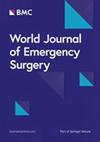Online extended focused assessment with sonography for trauma (EFAST) course enhanced knowledge and perceived confidence among medical trainees during the COVID-19 pandemic disaster
IF 5.8
1区 医学
Q1 EMERGENCY MEDICINE
引用次数: 0
Abstract
The COVID-19 pandemic disrupted medical education worldwide, prompting the need for innovative e-learning solutions. This study evaluated the effectiveness of an online extended Focused Assessment with Sonography in Trauma (EFAST) course, delivered via the International Emergency Medicine Education Project’s platform, to improve participants’ knowledge and perceived confidence in EFAST procedure. A prospective observational study was conducted between May 17, 2020, and December 20, 2023. Pre- and post-course quizzes and surveys were used to assess participants’ knowledge and confidence. Participant demographics, quiz scores, and survey responses were collected. Quantitative data were analysed using the Wilcoxon Signed-Rank test and Cohen’s d to evaluate knowledge improvement and confidence changes. Thematic analysis of qualitative feedback was performed with the assistance of large language model AI tools for emerging themes. 1758 participants enrolled in the course. From 111 countries, 1515 started the course, and 1190 (78.6%) reached the final exam stage, with 96.1% achieving a passing score. 66.4% indicated they had never attended a prior ultrasound course. Most (81.1%) were medical students, interns, or residents. 36.5% of participants were from low- or lower-middle-income countries. 1175 (77.6%) participants completed both the pre- and post-course formative knowledge quizzes. The median (IQR) scores were 53.3 (40.0–66.7) pre-course and 86.7 (73.3–93.3) post-course (p < 0.001, effect size: -0.958). 771 participants completed both pre- and post-course surveys. Participants’ median (IQR) confidence in EFAST increased from 5 (3–7) to 8 (7–10) (p < 0.001, effect size: -0.844). Qualitative feedback showed that participants found the course practical, well-structured, and effective. They suggested improving video quality and simplifying content for clarity and engagement. The online EFAST course enhanced participants’ knowledge and perceived confidence, demonstrating the potential of online clinical education during global crises.在线创伤超声扩展重点评估(EFAST)课程在2019冠状病毒病大流行灾难期间增强了医疗学员的知识和信心
COVID-19 大流行扰乱了全球的医学教育,促使人们需要创新的电子学习解决方案。本研究评估了通过国际急诊医学教育项目平台提供的创伤超声聚焦评估(EFAST)在线扩展课程的有效性,以提高参与者对 EFAST 程序的了解和信心。这项前瞻性观察研究在 2020 年 5 月 17 日至 2023 年 12 月 20 日期间进行。课程前后的测验和调查用于评估参与者的知识和信心。研究收集了参与者的人口统计数据、测验分数和调查回复。使用 Wilcoxon Signed-Rank 检验和 Cohen's d 对定量数据进行分析,以评估知识的提高和信心的变化。在大型语言模型人工智能工具的帮助下,对定性反馈进行了主题分析,以寻找新出现的主题。共有 1758 名学员报名参加了课程。来自 111 个国家的 1515 人开始了课程,1190 人(78.6%)达到了结业考试阶段,96.1% 达到了及格分数。66.4%的学员表示从未参加过超声课程。大多数学员(81.1%)是医学生、实习生或住院医师。36.5%的学员来自低收入或中低收入国家。1175名学员(77.6%)完成了课程前和课程后的形成性知识测验。课程前的中位数(IQR)分数为 53.3(40.0-66.7),课程后的中位数分数为 86.7(73.3-93.3)(P < 0.001,效应大小:-0.958)。771 名参与者完成了课程前和课程后的调查。学员对 EFAST 的信心中位数(IQR)从 5(3-7)提高到 8(7-10)(p < 0.001,效应大小:-0.844)。定性反馈显示,学员认为课程实用、结构合理、效果显著。他们建议提高视频质量并简化内容,以提高清晰度和参与度。在线 EFAST 课程提高了参与者的知识水平和自信心,证明了在线临床教育在全球危机中的潜力。
本文章由计算机程序翻译,如有差异,请以英文原文为准。
求助全文
约1分钟内获得全文
求助全文
来源期刊

World Journal of Emergency Surgery
EMERGENCY MEDICINE-SURGERY
CiteScore
14.50
自引率
5.00%
发文量
60
审稿时长
10 weeks
期刊介绍:
The World Journal of Emergency Surgery is an open access, peer-reviewed journal covering all facets of clinical and basic research in traumatic and non-traumatic emergency surgery and related fields. Topics include emergency surgery, acute care surgery, trauma surgery, intensive care, trauma management, and resuscitation, among others.
 求助内容:
求助内容: 应助结果提醒方式:
应助结果提醒方式:


